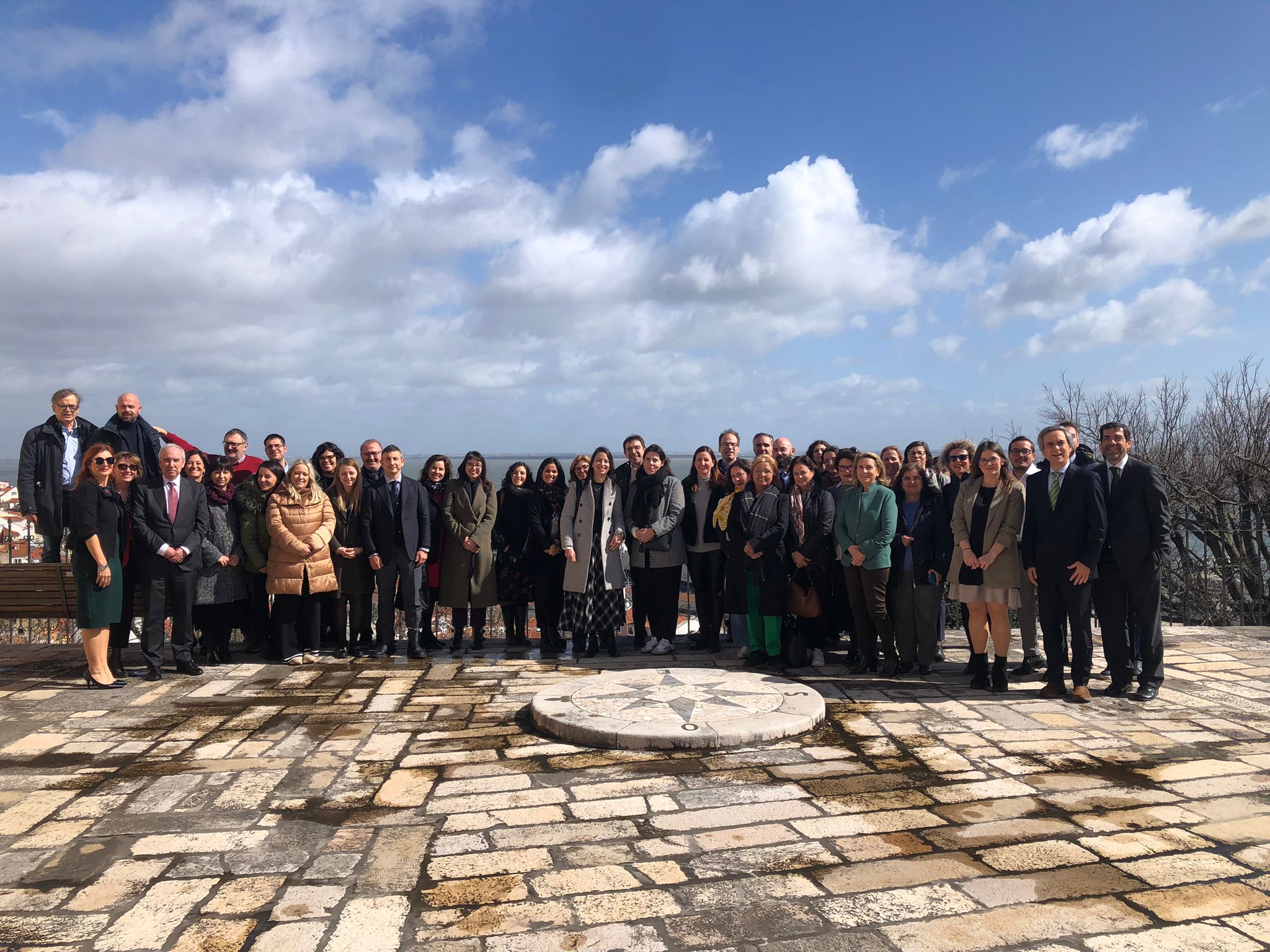On 26 February 2024, over 65 Italian and Portuguese legal professionals attended the launch of the Council of Europe HELP course on Child-friendly Justice
This course was created in 2017 and updated in 2023, in the framework of the EU-CoE “HELP in the EU III” Project, funded under the European Union’s Justice Programme (2021-2027). The cross-border event, organised in the framework of the same project, was held in Lisbon (Portugal). The event was organised by the Council of Europe (CoE), in collaboration with the Centre for Judiciary Studies from Portugal (Centro de Estudos Judiciarios) and the School for the Judiciary from Italy (Scuola Superiore della Magistratura).
The event was moderated by Pedro Raposo de Figueiredo, HELP tutor and Coordinator of the Training Department of the Centre for Judiciary Studies from Portugal. The day began with introductory remarks from Fernando Vaz Ventura, Judge of the Supreme Court and Director of the Centre for Judiciary Studies from Portugal. He acknowledged the relevance of the topic of the course for the attending participants and emphasised the significant contribution of the Human Rights Education for Legal Programmes (HELP) Programme in the human rights training for judges and prosecutors in Portugal. He expressed commitment to further collaborating with the Council of Europe on human rights training.
Several interventions relevant for the topic of the course followed. Ana Maria Guerra Martins, Judge at the European Court of Human Rights, talked about the case-law of the ECtHR related to child-friendly justice. She examined cases related to both civil and criminal proceedings and talked about situations in which children are victims, perpetrators or third parties. She discussed the particular vulnerability of children, the necessity to give priority to the best interest of the child and the different elements to be considered in order to ensure the participation of the child in the proceedings.
She touched upon a variety of matters, such as adoption, separation from parents, international child abduction, deprivation of liberty and trafficking in human beings, making reference to the rich ECtHR jurisprudence on the matter, including cases such as Salduz v. Turkyie (2008), Ioan Pop and others v. Romania (2016) and Hernehult v. Norway (2020).
Rosa Martins, family law professor at the Law Faculty of the Coimbra University from Portugal, talked about children and their participation rights. She examined the development of perspectives and legal instruments over time concerning the participation of the child in legal proceedings. She described the work of Ellen Key and of Janusz Korczak; she took the participants on a journey from times when children were seen as an inferior being, to the present day, where the principle of child participation is reflected in all major European human rights instruments, including the European Convention on Human Rights and the EU Charter of Fundamental Rights. She advocated for the child being perceived as an active subject in the drawing up of their future.
Maria Carla Gatto, President of the Juvenile Court of Milan and expert trainer of the School for the Judiciary from Italy, talked about children in judicial proceedings and practices and challenges encountered in Italian courts. She described how hearings of children take place, who is and who should be present, in what type of environment they should happen and what measures are to be taken to ensure an adequate protection of rights for all parties involved. She emphasised that children are not to be treated like adults during legal proceedings; their intellectual and emotional maturity must be taken into consideration; due regard must be given to their opinions and they should not be given the impression that decision-making powers are in any way fully awarded or stripped away from them.
Laura Esselin from the North South Centre of the Council of Europe invited participants to reflect on the role that young people and civil society can be involved to promote child-friendly justice systems. She also talked to the participants about the work of the Centre in relation to the fight against sexual violence against children (the Lanzarote Convention) and cyberviolence and cyberbullying (the Budapest Convention). She ended by presenting the Centre’s activities during which HELP courses were launched and praised the opportunities created in human rights training by the HELP Programme.
During this launch event the participants also got acquainted with the HELP programme and its online platform, which offers more than 45 courses on human rights. The two groups of participants met their respective HELP tutors, Maria Mendez and Miguel Vaz for the Portuguese group and Ivana Roagna for the Italian group. They guided the participants in a workshop where practical matters related to children involved in legal proceedings were discussed, such as the age at which it should be mandatory to hear children, who should be hearing children, how can hearing be carried out and who are the professionals that should be involved. The participants had the opportunity to discuss matters of particular interest to them and to share experiences.
Furthermore, the tutors provided some insights into the matters to be approached during the course. They will provide the participants with support and guidance during the following weeks. All participants have been registered on the dedicated course page and are now ready to start the tutored course. HELP certificates, issued by the Council of Europe, the Centre for Judiciary Studies from Portugal and the School for the Judiciary from Italy will be awarded to those who successfully complete the course.
******************************************
The HELP course on Child-friendly Justice talks about how children come into contact with the justice system in many different ways. This can be for family matters such as divorce or adoption, in administrative justice for nationality or immigration issues or in criminal justice as victims, witnesses or perpetrators of crimes. The course recognizes that, when faced with the justice system, children are thrown into an intimidating adult world which they cannot understand. It is therefore necessary to ensure that both access to and the processes within justice are always friendly towards children.
Guidance on how to create, support and provide child-friendly justice can be found across a variety of legal and policy instrument developed at the European and international level.
This HELP course for legal professionals (judges, prosecutors and lawyers primarily) covers in an interactive way the key concepts, the international and European legal framework and case law governing the prevention and protection of women and girls from violence, focusing on instruments developed at the level of the Council of Europe, the European Union and the United Nations. The instruments referred to include the Guidelines of the Committee of Ministers of the Council of Europe on child-friendly justice, the European Convention on Human Rights, the EU Directive on Access to a Lawyer, the EU Directive on Procedural Safeguards and the UN Convention on the Rights of the Child.
This course was developed jointly by the Children’s Rights Division and the HELP Programme of the Council of Europe and updated in 2023 in the framework of the EU-CoE project “HELP in the EU III”. The course is available on the Council of Europe HELP e-learning platform, in self-learning format, in English, as well as in several other languages. The access to the courses is free, open and self-paced for interested professionals who have a HELP account (or create one by using this link). The length of the course is of nine (9) hours and those who complete it can generate a personalised electronic Statement of Accomplishment.
The course is intended, in the long term, to become an integral part of the overall learning curricula of the national training institutions and/or other competent authorities of the CoE member states and beyond.





